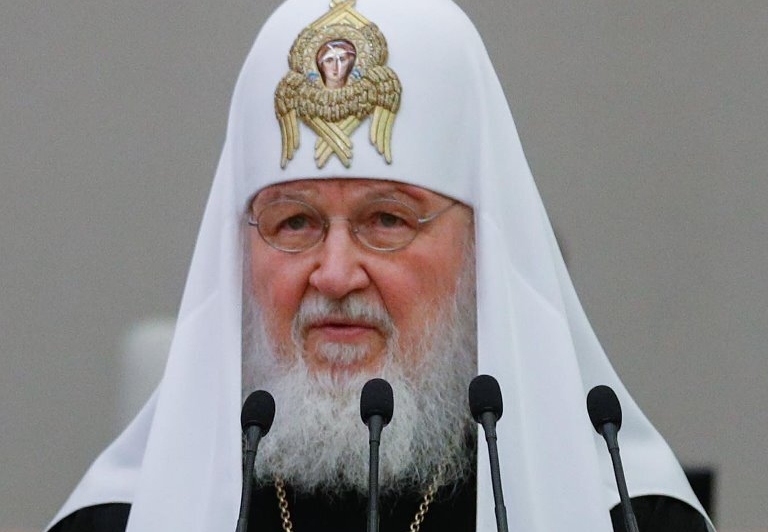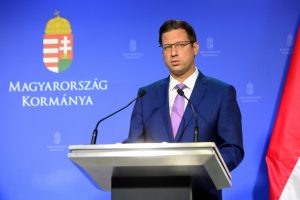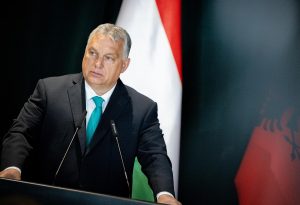
The POWs were reportedly from Western Ukraine's Transcarpathian region, where most of the Hungarian minority lives.Continue reading

The Government has adopted an economic protection action plan: there will be a price cap on electricity in some sectors and pharmaceutical companies will be able to write off half of their extra profit tax, the Minister of the Prime Minister’s Office said at the Government Information Meeting in Budapest on Monday. Gergely Gulyás also confirmed that Hungary will spend 2 percent of its GDP on its defense forces as required by NATO.
The minister said that the price ceiling will be set at €200/megawatt-hour net from July 1 and will apply to the manufacturing, accommodation, storage, and transport sectors. He explained that these are the sectors that have the greatest impact on the performance of the economy and on inflation, as they are productive or production-related activities. He added that in return, the government expects these firms to increase their production capacity and not to raise prices further for the rest of the year; this will be monitored by the Hungarian Chamber of Commerce and Industry.
Gulyás also added that the measure would affect more than 5,000 businesses and have a budgetary cost of HUF 40 billion. The Minister said that
the sharp rise in energy prices due to the war was weakening the economy and was a serious burden on businesses.
He noted that they had consulted with the Chamber of Commerce and Industry and the government saw one of the biggest problems for businesses as the price of energy, including electricity.
The Minister recalled that last year, when prices were higher, 81% of businesses signed fixed price contracts due to fear of skyrocketing prices. Today, he explained, one third of these companies pay over EUR 320/megawatt-hour for electricity and the average is also over EUR 250/megawatt-hour.
Hungary will continue to stand by its position calling for an immediate ceasefire and peace talks in Ukraine, the Minister emphasized. Gulyás said that the war situation has not become easier, but more difficult; the war has entered a new phase and more and more people are dying on the battlefield.
The minister said that the positive effect of the start of peace-talks for Hungary would be that as part of the European economy, the country would be freed “from the stranglehold of war,” which would immediately lead to a significant reduction in inflation.
According to the politician,
Hungary’s openly pro-peace stance is subject to a lot of criticism in the European Union, “and they would like to silence the Hungarian position.”
He added that this is because European societies are no longer united in what the European political elite is united in, thus Hungary will continue to stand by its position in favor of immediate peace talks. He noted that the government believes this is also the morally correct position.

Gergely Gulyás. Photo: MTI/Soós Lajos
He also said that next year, for the first time since the fall of communism, sufficient resources will be made available to enable Hungary to meet its commitments to the North Atlantic Treaty Organization (NATO). In next year’s budget, defense spending will reach two percent of gross domestic product, he said.
The Minister called Brussels’ decision on the migrant quota ‘unacceptable and extremely dangerous,’ saying that it was yet another abuse of Brussels’ power which must be opposed by all means. He said that the EU’s decision is an invitation to all those who want to come to Europe. “Hungary would be extremely disadvantaged in many respects by such a regulation,” he said, adding that therefore this must be fought.
Gulyás said that they might be talking about 30,000 migrants, but the European Commission could determine several times that number, and the regulation would allow this at any time. In addition, he added, Hungary would have to conduct 28 percent of asylum procedures, which is a disproportionate and extreme burden for the country.
He also said that the decision was a breach of an earlier promise, as the heads of state and government agreed at their last meeting to return to this issue at the EU Council. Here, a unanimous decision is required, whereas in the Council of Ministers a qualified majority is possible, he pointed out.
Gulyás added that when the regulation is adopted, it will have to be examined whether it goes beyond the limits allowed by EU law and whether the right Council decision was made. Not only the Court of Justice of the European Union, but also the Hungarian Constitutional Court could have a role in examining whether the EU has not exercised powers that have not been delegated to it, he noted.

Photo: SOS Mediterranee France Facebook
In the case of EU funds, “the ball is in Brussels’ court,” and it is a political decision whether the European Commission will take up the conflict with the European Parliament and give Hungary the money it is legally entitled to, Gulyás said.
In response to a question, the Minister said that it is not a legal but a political decision when the European Commission will “gracefully” disburse the EU funds due to Hungary.
It does not depend on us, it depends on when they will summon up the courage to take on the conflict with the majority of Hungarian MEPs in the European Parliament to give us the money we are entitled to according to the law,”
he told journalists.
He stressed that Hungary had also met the last “milestone,” as confirmed by the European Commission, since the only condition for access to the funds was the adoption of the “amendments they had requested in the judiciary, which otherwise had no basis in Community law.” This, he continued, should allow them to send invoices to the committee in early July. They would then have 90 days to consider whether or not to pay, he said.
Regarding the recent transfer of former Ukrainian prisoners of war from Transcarpathia (Western Ukraine) to Hungary, Gulyás said that he was informed about the case before they arrived here, and Ukraine was informed after their arrival. He said that this was fully in line with international law, because Hungary has no obligation to notify, and prisoners of war can be returned not only to the country they fought for, but to any other country if they agree to or request it.
He said that they were not really prisoners of war, because they had been released in Russia; they had been received by the Russian Orthodox Church as free men, and they had declared that they wanted to come to Hungary. We were not legally bound in this sense, but nevertheless, in order to avoid any misunderstanding, the Ministry of Foreign Affairs officially informed the competent Ukrainian authorities about the case,” he added. He stressed that they are not being monitored, they are not being watched, they are completely free, and those who are not Hungarian citizens have been granted refugee status.

There are no imminent plans for the Prime Minister to visit Ukraine. Photo: Facebook Viktor Orbán
Asked about a possible trip by the Prime Minister to Kiev, he said that if “substantial progress can be made on important issues,” then negotiations at the highest level are necessary. He indicated that “if it makes sense, of course we are ready” for such a visit.
Asked about the fact that the Ukrainian ambassador’s admission has not been signed by President of the Republic Katalin Novák for months, he said that the Ukrainians’ attitude towards Hungary and Hungarians does not justify a separate fast-track procedure for the granting of the declaration of admission.
On whether the escalation of fighting in the war in Ukraine has led to more refugees, the Minister said that when there is a worrying chain of events on the battlefield, more always come. Government spokeswoman Alexandra Szentkirályi added that between June 5 and 11, the number of refugees fleeing the war was 4,166, bringing the total number of people who have arrived in Hungary so far to more than 1.12 million.
Via MTI, Featured Photo: Facebook MH vitéz Szentgyörgyi Dezső 101. Repülődandár